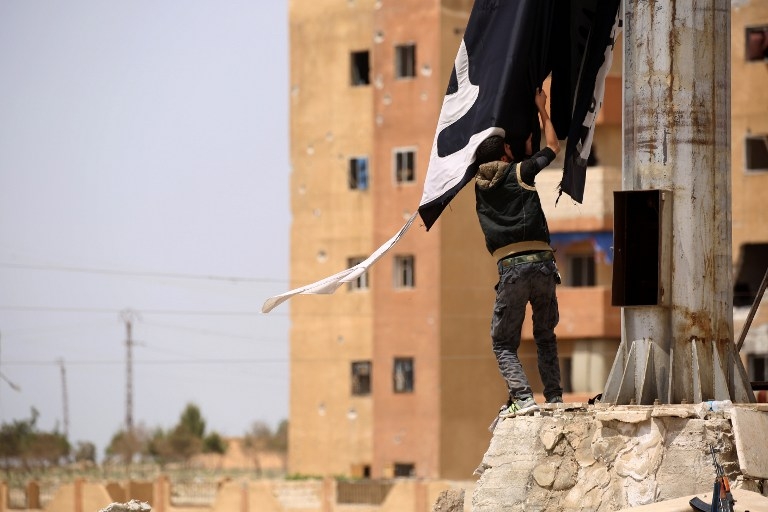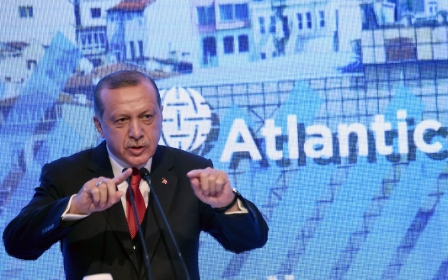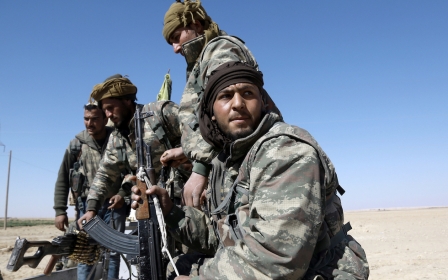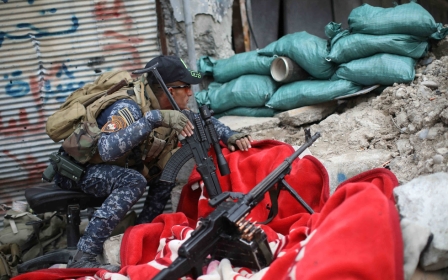Islamic State suicide bombers kill dozens at Syrian refugee camp

An Islamic State assault led by suicide bombers killed dozens on Tuesday at a camp for the displaced near Syria's border with Iraq, as pressure grows on the militant group in both countries.
The violence left at least 46 people dead and came as another surprise IS attack on Tuesday killed 10 soldiers in Iraq, to the south along the border.
The attack came as the US-backed Kurdish-Arab alliance known as the Syrian Democratic Forces presses an offensive against IS in the town of Tabqa as part of an assault on the IS bastion Raqqa.
As the tolls mounted, US President Donald Trump and his Russian counterpart Vladimir Putin discussed steps to ease the Syrian civil war, which has pitched Moscow and Washington into rival camps.
The dawn IS attack hit a makeshift camp where some 300 families were waiting to cross into SDF-held territory in Hassakeh province, in northeastern Syria.
"At least five suicide attackers blew themselves up outside and inside a camp for Iraqi refugees and displaced Syrians in Hassakeh province," said Rami Abdel Rahman, the head of the Syrian Observatory for Human Rights monitoring group.
Heavy clashes then erupted between the IS fighters and the SDF, some of whose combatants were among the dead, Abdel Rahman told AFP.
On Monday, the SDF captured most of the strategically vital town of Tabqa, 40km west of Raqqa along the Euphrates, it said.
It said on Tuesday that fierce fighting continued as the SDF sought to capture the last few districts of the town as well as an adjacent dam, Syria's largest, and the last major obstacle remaining before it can begin its assault on Raqqa.
The makeshift camp lies in the Rajm al-Salibi area just inside Syrian territory, and at least 21 of the dead were displaced Syrians or Iraqi refugees, the Observatory said.
"At least 30 people were wounded, and the death toll may rise because some people are in critical condition and others are still unaccounted for," the Britain-based monitor said.
Tuesday's Islamic State attack on Rajm al-Salibi was targeted at the Asayish, a Kurdish security force that operates in northeast Syria, the Observatory said.
Kamal Derbas, a press officer for the Kurdish Red Crescent, put the civilian death toll at 22.
He told AFP the attack began at 4am local time and that 35 people were wounded.
"The dead will be buried in al-Hol," he said, referring to the nearest town.
Civilians fleeing IS in both Syria and Iraq have made their way to the desolate border region seeking protection and onward passage to safety in Kurdish-controlled territory.
But conditions in the area are harsh, with little shelter and authorities often overstretched.
IS once controlled large parts of Hassakeh province, but it has been pushed out of almost all of it, with Kurdish authorities now in control of most of the area.
Syria's government maintains a small presence in the province, mostly in its capital Hassakeh city.
But IS remains a potent power in neighbouring Deir Ezzor province, from which many Syrians arriving at the border post are fleeing.
Backed by a US-led air coalition, the SDF has waged a months-long campaign against the militants across northern Syria and is now closing in on their bastion of Raqqa.
More than 320,000 people have been killed in Syria since the conflict began in March 2011 with anti-government protests.
The war has drawn in foreign armies and fighters, including militants fighting alongside IS.
The group is also on the defensive in neighbouring Iraq, where the army and allied fighters are pushing to recapture the city of Mosul from IS.
New MEE newsletter: Jerusalem Dispatch
Sign up to get the latest insights and analysis on Israel-Palestine, alongside Turkey Unpacked and other MEE newsletters
Middle East Eye delivers independent and unrivalled coverage and analysis of the Middle East, North Africa and beyond. To learn more about republishing this content and the associated fees, please fill out this form. More about MEE can be found here.




